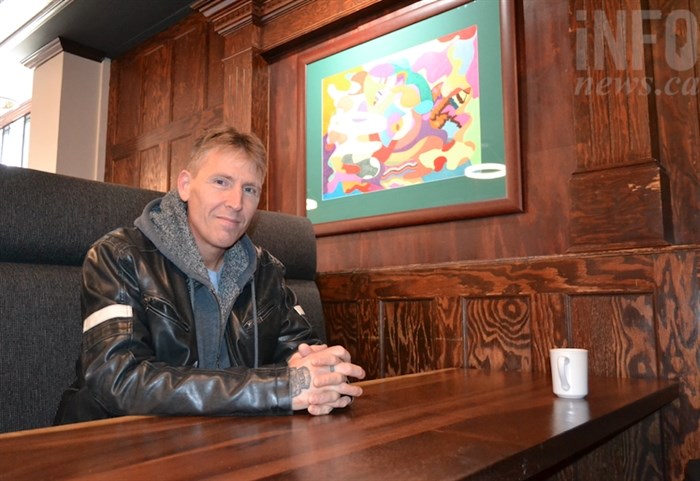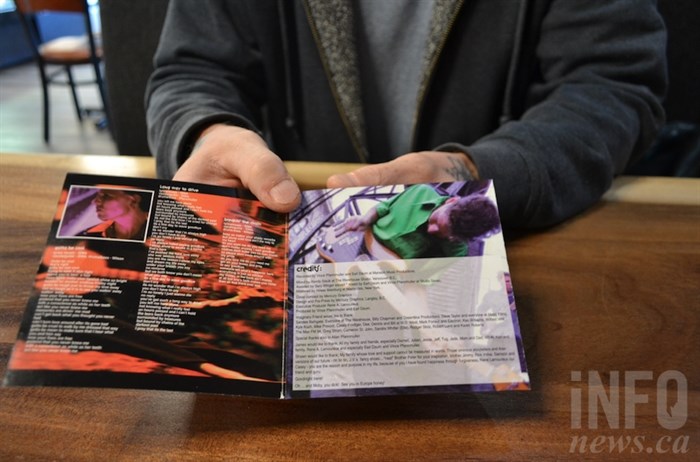
James Giles has lived through homelessness, addiction, and a life of rock and roll. Now, he is ready to create music once again.
(JENNA WHEELER / iNFOnews.ca)
October 28, 2019 - 12:02 PM
James Giles has been through it all from the high life of an up-and-coming musician to the depths of drug abuse. But now, with treatment, support for his addictions and now back in housing, he is back to making music and pulling from his experiences that include losing his best friend and band-made to an overdose.
Giles was living in Prince George in 1997 when he attended an open mic night and saw a man covered in paint and drywall, and didn’t know then that the man, Sean Wilson, would soon become an integral part of his life. The two formed a band called Imaginary Friend and went on to create an album with Randy Staub in The Warehouse recording studio owned by Bryan Adams, and had their music broadcast throughout the country.
“We met and we wrote songs together but in about a year’s time is when we decided, ‘This is really good stuff, we need to do an album,’” Giles says. “We went from recording on little ghetto blasters, slapping our hands on our knees laying demos to having a video on Much Music which we shot in New York City and having a song on the radio.”
The musician life was not easy on either of the men. Both had a history of addiction, and Giles says the men struggled with accepting their success.
“I was sitting in Bryan Adams' studio and Randy Staub was looking across the board at me and he said, ‘It’s an h-word man, it’s an h-word’ and I thought to myself, ‘What is he talking about? Does he know I’m on heroin?’ And he said, “It’s a hit.”... I just remember not understanding that and not accepting that.
The song considered a hit by Staub was Gotta Be Cool, and another song, Passerby, was shown on MuchMusic. Giles says the group couldn’t keep it together enough to advance their careers.
“It just went and mowed all of our lives over basically, none of us could really handle it. Me, I didn’t want to handle it. I had other stuff deep, deep inside I was trying to hide and I didn’t feel worthy of success,” Giles says.
Giles says he grew up with a dysfunctional family, and faced many challenges as a young child. His addiction started when he met his biological father at 16 years old. His father got him started on hard drugs and alcohol.
“I loved that man. I met him when I was 16 and by the time I was 22 or 23 he died of his addiction. It was the same way with my grandfather’s addiction,” Giles says.
Giles raised three children while in the band and an addict. He says he regrets living that way, but is now working on rebuilding the fractured relationships. Giles says all of the bandmates faced their own kind of addiction, which ultimately led to the group’s downfall.
“We were high all the time time. Sean was a terrible drunk, a terrible addict, and I was an addict,” Giles says. “Sean couldn’t make it to a gig, we didn’t know where he was, and they got another bass player who couldn’t play. That’s when drugs started affecting things.”
Imaginary Friend broke up and Giles and Wilson later decided to try again with a band called Misconceptions.
The pair decided to go for more of a rock vibe, but ran into issues with their manager and called it quits again. After the pair decided to get out of the music industry, drugs became a predominant part of both of their lives and eventually took Wilson’s.
“The first song Sean and I ever wrote, he did the lyrics... he said, ‘In the alleyway lined with trash, I fell down, that's where I found class. Blind to reason, bitter past, if you find a good thing, make it last.’ It’s just funny how that’s the very first song we wrote and in the end he died in an alleyway with a needle in his arm. It’s sad. He was my best friend.”

Giles holds the lyric page from the Imaginary Friend CD. He is pictured on the left-hand side, while bandmate and late friend Sean Wilson is pictured on the right.
(JENNA WHEELER / iNFOnews.ca)
Giles became homeless, living at friends’ houses, shelters, and often on the street. He made most of his money by busking on street corners, creating songs with the names of the people passing by. He lived in areas like East Hastings in Vancouver and Leon Street in Kelowna. He says he would use any drug he could get his hands on, and preferred to live on the street as that’s where most other hardcore addicts lived.
“I was walking out in the morning with some crispy socks, because I had been wearing them for a couple of weeks and crispy underwear and a crispy set of jogging pants and a crispy tank top, trying to look tough and trying to look strong, but just broken, and a seagull shit and it hit my head. So I had bird shit in my hair and I remember looking around and going, ‘Really? I was in Bryan Adams studio, I had a video on Much Music, my song is on the radio… from that, to this? Really?’”
He says the next day, an old friend from Kamloops passed him on the street, picked him up and took him to the Emerald House.
“I was at the Emerald House and I was begging Crossroads for a bed and they were like, ‘Uhh, we don’t know,’” Giles says. “It took them a while to consider whether they would let me in or not... I was not very human in the end.”
Giles got clean and was allowed to move into Crossroads and began to get back into music while there.
“I was living in Crossroads in 2014 and from there until now something has happened. I’ve slowly learned to love myself again and stop using,” Giles says. “I’ve got the greatest songs I’ve ever had now and they’re really good… I play these songs for people and they start to cry.”
After about a year, he was then moved into Henry Leland House, another supportive housing facility, and now calls the Blue House home. Giles says his recovery has been aided by the belief in a higher power and says his new album, Redemption, will focus on the struggles he has overcome. He hopes the record will reach people who have been in or are still in a state of addiction.
He will go into the Cheslatta Records recording studio later this year and hopes to have the album out come spring. He says now that he has worked on rebuilding relationships with his children, he hopes to feature the voices of his three grandchildren on one of his songs.
To contact a reporter for this story, email Jenna Wheeler or call (250) 819-6089 or email the editor. You can also submit photos, videos or news tips to the newsroom and be entered to win a monthly prize draw.
We welcome your comments and opinions on our stories but play nice. We won't censor or delete comments unless they contain off-topic statements or links, unnecessary vulgarity, false facts, spam or obviously fake profiles. If you have any concerns about what you see in comments, email the editor in the link above.
News from © iNFOnews, 2019